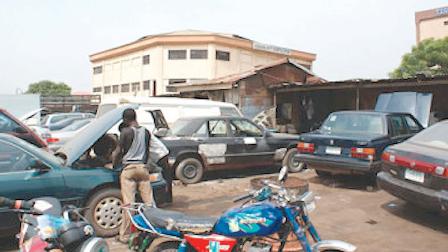By: FEMI OWOEYE
The age when vehicles were mere machines without brains is gone. That was the age when vehicles used carburettors, which would inject petrol into the combustion chamber, plug creating sparks into the chamber, causing explosion, force of which would turn the crank shaft, which would roll the wheels and get the car moving.
Today’s vehicles are clever. They have what is known as brain box, where decisions as to when to inject fuel into the burning chamber and at what quantity are taken. Akin to human skull. A modern car does many things by itself. Some activate their wipers, as soon as it rains. Some switch on headlamps, when it is dark.
All I am saying is that unlike the olden days, automotive technology are no more the same. But skills of many Nigerian auto mechanics and technicians are. Despite efforts being made by National Automotive Council(NAC), Lagos State government and certain private organizations such as AUTOMEDIC, it is sad that not much have changed. Experts of those days have become quacks of today. For they trained with old vehicles, but never bothered to retrain. Neither would they confess to an unsuspecting motorist that they are not knowledgeable about modern vehicles. They pretend to know. But all they do is trial-by-error. In the process, motorists suffer. Many have had to sell their precious automobiles for peanuts.
Recently, I had a minor breakdown at a filling station and somebody recommended a mechanic, who shortly arrived on a rickety Suzuki Motorcycle. Sighting the car, his body language got me apprehensive. He asked me to open the bonnet. I obeyed, but remained vigilant. After looking at the engine for about 20 seconds, he walked towards the rear end of the car, making a phone call. I got out of the car and strolled towards him, stopped at a distance, where I could hear his phone conversation.
And what did I hear? The supposed mechanic was making consultation, seeking for an advice. That was it. I told him I was no more interested in his service. I was lucky. Another motorist named Kole was not.
Kole, a resident of Ado-Ekiti, Ekiti State, Nigeria, owns a 12-year-old Sports Utility Vehicle(SUV). He would not hand it over to any mechanic until a trusted friend recommended one. Quite humble and polite, the mechanic(name withheld) would meet Kole at work, take his car away for servicing and returned it before closing. But less than a year, something happened. Kole’s car stopped on his way home. He tried starting the car without success. The engine rolled but won’t start. He called his mechanic, who responded and told him the problem was fuel pump, promising to get the car to Kole’s residence somehow.
With Kole on the front passenger’s seat, the mechanic put the car on first gear, pressed not the clutch, turned ignition key and as the engine rolled, the car moved forward. That was how he dragged the car along a distance of about 50 metres until he got to Kole’s residence, where the car was parked. Unknown to Kole, his kick starter was ruined that night. For using it to roll and toe the car home.
Following day, the “trusted mechanic” was at Kole’s home with a rewire, claiming to have bought a fuel pump. The car still did not start after fixing the pump.
“What again?” Kole protested.
The mechanic and his rewire friend said the car needed new set of plugs. In addition to N7,000 already spent, Kole released more money for plugs. The car still did not start until pushed. At the end, Kole spent a total of N10,700 to get the vehicle start. But while driving the car afterwards, fuel gauge had started malfunctioning and its engine revved up and down abnormally. Kole complained to the mechanic again but kept managing the car to work. Three weeks after, one early morning, the car would not roll at all. Rewire diagnosed kick starter for which Kole was charged N12,000. Less than two months after, the problem for which fuel pump was changed ensued again. Getting frustrated, Kole contacted the mechanic, who blamed wiring problem, adding that the car’s injector had packed up and so needed to be replaced. Kole loved his car so much and so would do anything to preserve it.
The mechanic, in connivance with his rewire colleague, charged Kole N25,000 to buy another used injector. At that stage, Kole discussed with a friend at work, who recommended another mechanic. It’s one of the few standard workshops in Ekiti State. The new mechanic simply cleaned the injector nozzle, started the car and the performance of the engine got normalized.
He told Kole there was no need to change his injector. Moreover, the injector bought for him was not the one meant for Kole’s car. That was the end of his six-month frustration during which he had been conned close to N50,000.
On a regular basis, hundreds of motorists have similar experiences across Nigeria. All for taking their cars to mechanics trained to repair olden days vehicles, but who today are quacks. Modern cars are not cheap. Whether brand new or imported used vehicle, it does not matter. Operations and performance of most modern vehicles are managed largely by brain box and censors. Taking such cars to counterfeit mechanics or rewires, all because they seem cheap or affordable, might end with bitter experience.
Problem with automobile maintenance in Nigeria is lack of standardization. NAC’s Automotive Technical Skills Upgrade Scheme(ATSUS) is a timely and fantastic idea. Upgrade training if offered auto mechanics and technicians through National Automobile Technician Association(NATA). But for the programme to benefit the nation’s motoring public, it should be made compulsory. Secondly, not all artisans belong to NATA. There are other parallel associations. There are lots of docile members, many of who hardly attend meetings.
There is, therefore, a need to set up a compulsory training and certification/licensing programme for all practicing auto mechanics and technicians in Nigeria. Such trainings should be updated periodically, as auto technology now advances at jet speed. With that, motorists would be able to differentiate between quacks and up-to-date artisans.

This programme should not be the responsible of the government alone. As a company like R.T Briscoe used to do, automobile manufacturers, assemblers and franchise dealers should endeavour to invest in training programmes for mechanics and technicians specialising in maintenance of their brands.




